Kitchen Feng Shui: Tips for arranging household items to turn bad luck into good luck
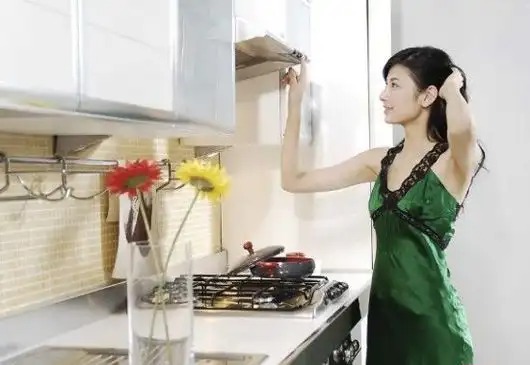
According to the I Ching's Five Elements generation order, east represents wood and south represents fire. Therefore, facing south (where fire thrives) or east (where wood generates fire) is considered auspicious. It's best to follow the following principles for kitchen stove placement, which is sound from both traditional feng shui and modern environmental and psychological perspectives.
1. Kitchen stove decoration
The so-called "stove mouth" originally refers to the entrance for firewood. For gas stoves, it refers to the air intake of the kitchen stove, located behind the ignition switch. Whenever possible, the stove mouth should face the Shengqi direction of the male or female host. If kitchen design limitations prevent the stove mouth from facing any of the parents' auspicious directions, trying to face the mother's Yannian direction can also enhance family harmony.
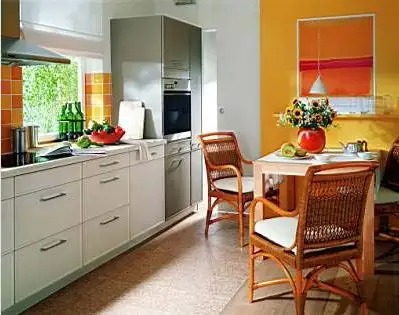
The kitchen stove should not face the kitchen door or the bathroom door. If it does, the bathroom door must be kept closed. A kitchen stove located below the bathroom on the upper floor is considered inauspicious and should be relocated. If relocation is not possible, install an upward-facing light. The kitchen stove should not be located in a corner of the kitchen, so that the cook faces away from the kitchen entrance. The kitchen stove should also not be placed under a water tower, as water extinguishes fires and symbolizes a failure to accumulate wealth.
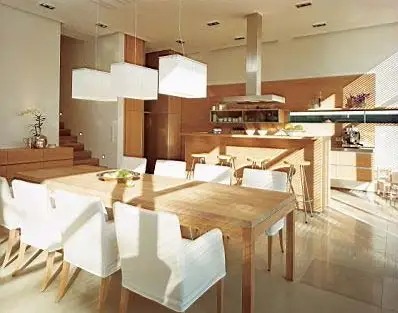
According to the order of the five elements in the Book of Changes, the east belongs to wood and the south belongs to fire. Therefore, it is auspicious to have the kitchen stove facing the south where fire is strong or the east where wood generates fire.
The placement of the kitchen stove should follow the following rules, which are reasonable from the perspectives of traditional Feng Shui, modern environmental protection, and psychology:
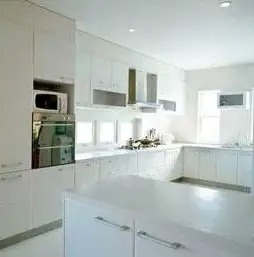
Kitchen Feng Shui: Tips on how to ward off bad luck with various furniture and items
(1) Avoid having the kitchen stove directly facing the door
In traditional Feng Shui concepts, the kitchen is considered to be where the family cooks and maintains life, so it should not be directly impacted by the nearby energy brought in by the door.
(2) Avoid standing close to the vegetable sink
The stove belongs to fire and the sink belongs to water. Water and fire are incompatible, so they should not be too close to each other.
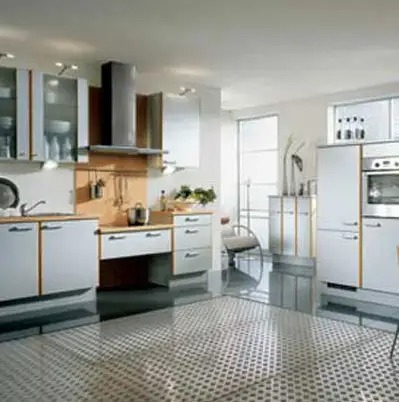
Kitchen Feng Shui: Tips on how to ward off bad luck with various furniture and items
(3) Avoid hanging the stove in the air
Due to lack of space, people often place stoves in a suspended position on the window sill or anti-theft net. According to tradition, it is best to let the stove "land". The ancients believed that this would benefit from the earth's energy and be beneficial to wealth. From a modern safety perspective, it can avoid many safety hazards.
(4) Avoid exposure to the sun
The stove should not be placed in the west. Traditional feng shui believes that the west's "metal" energy is suppressed by the stove's "fire," which is inauspicious. Sunset in the west brings a gloomy atmosphere, and when cooking dinner, the stove absorbs this "gloomy energy," which is inauspicious. Food cooked on the stove, exposed to the setting sun, is susceptible to changes in form, making it easy for people to become ill.
(5) Balance of Yin and Yang
The kitchen is a place where water and fire collide. A harmonious balance between these two elements contributes to the prosperity of the home. The kitchen is a Yin area, serving as a place for food storage rather than a place for regular family use. However, using a corner of the kitchen as a temporary dining area can enhance the kitchen's Yang energy and achieve a balanced Yin and Yang.
(6) The stove should not face the door
The stove should not be placed directly opposite the door or close to the window, because if the gas stove or LPG stove is blown out by the wind, it will leak liquefied gas, which is very dangerous.
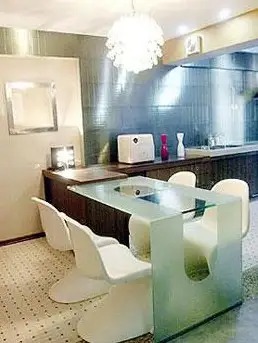
(7) Avoid using black or red stoves
When choosing a stove or building a cooktop, some colors should be avoided, such as red, as it represents fire, and stoves also belong to the fire element. From a color psychology perspective, red can also easily make people irritable, so it's best to avoid it. Black is also not a good option.
2. Kitchenware Arrangement
If you use a microwave oven or rice cooker, it should be placed in one of the four auspicious directions for the owner. The sockets for rice cookers and microwave ovens should also be located in an auspicious direction. The same principle applies to toasters and slow cookers.
Cooking utensils should not be placed in front of or under windows, as this symbolizes a family without support. Cooking utensils should not be placed under beams. If changing the stove's position is unavoidable, two bamboo flutes can be hung from the beam with red strings to mitigate this problem. Cooking utensils should not be placed against sharp corners of cabinets or tables, or directly facing stairs.
3. Mirror placement
The use of mirrors in feng shui has both positive and negative effects. Proper mirror placement can enhance or improve feng shui, but improper placement can cause significant harm to the occupants. One taboo when hanging mirrors in the kitchen is that they shouldn't reflect the stove. Hanging a mirror on the wall behind the stove, where it reflects food in the pot, can be even more damaging. On the other hand, hanging a mirror in the dining area, where it reflects the food on the table, can double the family's wealth. Mirrors are inauspicious when facing the stove, so before installing a mirror, check whether it's directly facing the stove. Furthermore, mirrors facing the door or the room itself are also inappropriate; however, placing them near the door is fine.
4. Blade placement
Kitchen knives and fruit knives should not be hung on the wall or inserted into a knife rack, but should be stored in a drawer. Garlic, onions, and peppers should also not be hung in the kitchen, as these will absorb negative energy.
To attract wealth, the refrigerator should never be empty, and the rice jar should be filled at all times, symbolizing a secure home. Three coins in a red envelope should be placed in the rice jar to attract wealth.
5. Goldfish bowl
The goldfish tank cannot be placed in the kitchen, nor can it face the stove. The goldfish tank belongs to the water element in the five elements, and it is an item with a very high water nature. If it faces the stove, it will create a situation of water and fire fighting each other, so the goldfish tank cannot be placed in the kitchen.
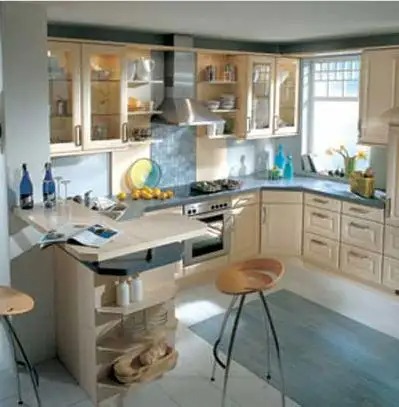
Kitchen Feng Shui: Tips on how to ward off bad luck with various furniture and items
6. Arrangement of kitchen plants
When greening your kitchen, choose hardy plants for embellishment, as kitchens are often exposed to fumes and steam, which are detrimental to plant growth. Delicate and fragile plants struggle to survive in the kitchen. Slow-growing, drought-tolerant cacti, such as prickly pear, prickly pear, and aloe vera, are suitable options. Alternatively, consider hardy perennial foliage plants. Since fumes and steam are detrimental to plant growth, give your plants regular "baths." If your kitchen has large windows, plant hanging plants in front of them.
If the kitchen is located in the south, placing foliage plants can soften the sun's rays, reduce the tendency for stray light, and aid savings. A kitchen located in the east is optimal; if located in other directions, red flowers can be placed on the table or near the refrigerator to promote good health. For a kitchen located in the west, placing golden flowers, daffodils, and pansies by the window can not only block the negative energy of the setting sun but also bring wealth. For a kitchen located in the north, pink and orange flowers can add vitality to the interior.
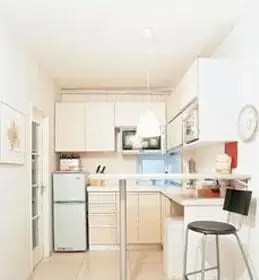
Kitchen Feng Shui: Tips on how to ward off bad luck with various furniture and items
7. Kitchen sundries
Spoons and shovels: If the end of the spoon or shovel is stainless steel, the handle should be made of wood. If the handle is made of plastic, white or green should be used; red and black are not good.
Rice Cooker: The rice cooker is used to cook rice, so it directly affects a person's vitality and wealth. A dirty rice cooker will not bring sufficient vitality and wealth, so keeping the rice cooker clean is very important.
Teapots: Teapots, with their yang water energy, have a significant impact on women's health. Avoid leaving stale water in a teapot and avoid placing it near a microwave.
Pots: Pots represent the user's foundation. Unused pots disperse their "chi," so discard them as soon as possible. Avoid using pots that are too cheap. Caution: Burnt pots can reduce your financial luck.
Chopsticks: Chopsticks are a small symbol of the user's status, so the chopsticks used by the host should never be cheap. If you want to improve your luck, it is best to use wooden chopsticks that have a sense of class. If the paint on the chopsticks has peeled, replace them immediately.
Scouring pads: Scouring pads have two functions. First, they are used for cleaning in the kitchen and dining room, and second, they serve as a bridge between various interpersonal relationships. If the scouring pad is dirty or torn, malicious people will approach, and the owner will be easily involved in disputes.